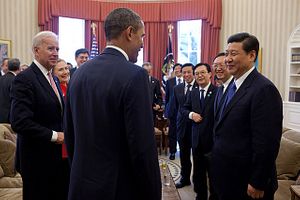China’s economic and military muscle has blunted the United States’ ability to influence Chinese policy. Instead of just considering direct counter-measures, however, the U.S. should pursue domestic reforms that ensure it will outcompete China. The U.S. should focus on what it can control: Drive domestic reforms that strengthen its competitive advantages, pressuring China to either accept reform or be left in the dust.
Chinese president Xi Jinping’s state visit with U.S. President Barack Obama brought little action on key concerns for Americans and American companies; the U.S. lacks the leverage to influence China’s behavior on key issues such as market access for American companies, cyber theft, sovereignty disputes in the South China Sea, and intellectual property protection. While Xi’s state visit did produce the standard rhetoric from Beijing about dedication to reform, the U.S. again must wait to see if China’s actions match its words.
Many China experts struggle with appropriate solutions because each response comes with significant drawbacks. Push China too hard, and risk retaliation in the form of pressure on American companies in China, further cyber intrusions, and unilateral actions in the South China Sea. If the U.S. doesn’t push hard enough, China will continue to flex its muscles. By its very nature, U.S. policy towards China is reactive and more about adapting to new challenges that China creates. The United States should instead prioritize and achieve commercial and cultural goals that force China to get on board with real reforms for fear of being outcompeted.
The Chinese Communist Party derives its legitimacy from its ability to deliver economic opportunities to its massive population. The U.S. should continue to confront China on issues that affect its core interests. However, outcompeting China will force the Party to pursue the economic and political reforms necessary to catch up in a way that U.S. military or economic containment could never achieve.
If the U.S. is unsatisfied with China’s attempts to address intellectual property (IP) theft by Chinese companies, it should double down its investment in education. Improving access to a good education for all income levels would not only improve equality, but it would enfranchise an often overlooked segment of future engineers, scientists, artists, and entrepreneurs to lead America’s effort in the competitive global economy. The U.S. currently ranks 35th in math and 27th in science education globally. Critically, education failures in the U.S. are becoming a future national security concern.
While relying on IP theft for technological advances would leave Chinese companies forever one step behind their American counterparts, empowering a diverse American population is a competitive advantage that China simply cannot match. Meaningful education reform would extend America’s global leadership in innovation over China for years to come.
If the U.S. wants to challenge China’s increasing aggressiveness in the South China Sea, it will require sustained military investment long into the future. To maintain this effort, the U.S. should look internally at reining in wasteful government spending, including in the military. Government oversight groups have identified nearly $700 billion in wasteful military spending in recent years. The looming budget battle in Congress could lead to another embarrassing government shutdown, seriously impairing military preparedness. That could also be avoided with disciplined fiscal management. Instead of counterproductive political grandstanding, U.S. leadership should make the necessary budgetary adjustments that further the national interest.
A healthy, efficient government that eliminates pork barrel spending would help ensure the long- term viability of the armed forces – and ensure they can challenge China for years to come. An efficient military will support a coalition of countries that challenge China’s aggressiveness, encourage China to accept international norms, and influence China to play by global rules.
If the U.S. is worried about China’s human rights record and its declarations of an ideological war with the West, then it should rekindle the flame of soft power that carried it through the Cold War. Making the tough political decisions that create affordable access to healthcare and reduce the militarization of the police would go a long way towards restoring America’s image in the world.
Increased soft power will attract top talent from across the globe to work in the U.S. A global workforce willing to question authority and challenge the status quo is at the heart of America’s competitive strength. Promoting these values, which are too often suppressed by the Chinese system, will ensure the American workforce is more diverse and competitive than China’s long into the future.
Instead of waiting for Chinese leadership to implement its highly touted reforms, the U.S. should be proactive in reforming itself. The Chinese will continue to reform at a snail’s pace until they are sufficiently at risk of falling behind. However, once America’s house is in order, China will recognize the need to reform its economy and government to successfully compete, or it will be left behind in this global race to success.
Sun Tzu in The Art of War famously said, “If you know your enemy and know yourself, you need not fear the result of a hundred battles.” While American leadership knows China, it is not clear yet that they know themselves.
Matthew Margulies is a China analyst for Crumpton Group, a crisis management and strategic advisory firm in DC started by CIA veteran, Ambassador Hank Crumpton.

































